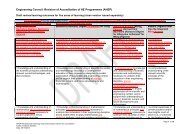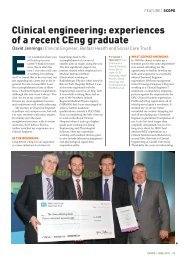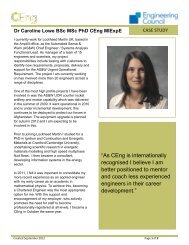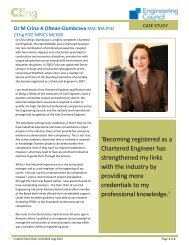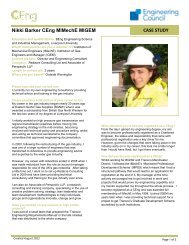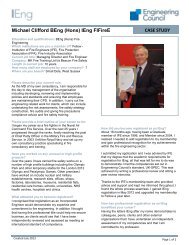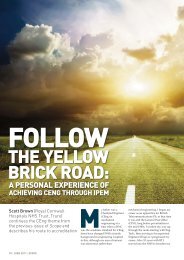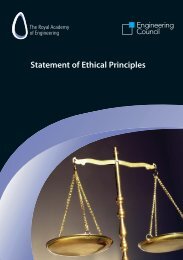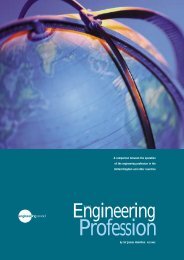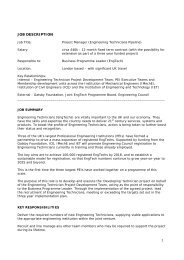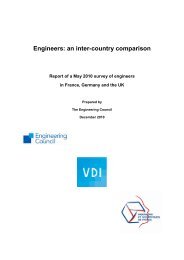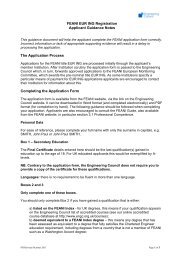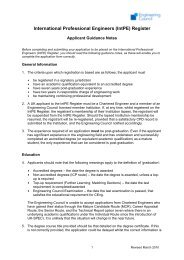An Engine for Change - A Chronicle of the Engineering Council
An Engine for Change - A Chronicle of the Engineering Council
An Engine for Change - A Chronicle of the Engineering Council
You also want an ePaper? Increase the reach of your titles
YUMPU automatically turns print PDFs into web optimized ePapers that Google loves.
1996-1998: THE RUDGE YEARS 139Mike Heath believed that his job was to trans<strong>for</strong>m <strong>the</strong> understanding in Britain <strong>of</strong> <strong>the</strong> role <strong>of</strong>engineers in Society, leading to a position alongside o<strong>the</strong>r pr<strong>of</strong>essionals such as doctors andlawyers. He wanted <strong>the</strong> status <strong>of</strong> engineers in Britain to match that in countries such as <strong>the</strong>USA, Germany, France and Japan. He also wanted to ensure that Britain was at least a match<strong>for</strong> <strong>the</strong> o<strong>the</strong>r major economies in <strong>the</strong> world in terms <strong>of</strong> <strong>the</strong> standards set and en<strong>for</strong>ced <strong>for</strong> <strong>the</strong>pr<strong>of</strong>ession.Despite such l<strong>of</strong>ty ideals, Mike Heath’s first major challenge was his belief that <strong>the</strong> finances<strong>of</strong> <strong>the</strong> EngC were in a dire state, heading <strong>for</strong> a £1M deficit in 1996 and more <strong>the</strong>reafter. Facedwith uncom<strong>for</strong>table realities, <strong>the</strong> <strong>Council</strong> did later agree a small fee increase <strong>for</strong> 1997,ostensibly to enable <strong>the</strong> new edition or SARTOR to be promoted after it was published.Later in mid-2000 Mike Heath expressed in retrospect: “It rapidly became clear to me that <strong>the</strong><strong>Engine</strong>ering <strong>Council</strong> had to get its message across to a number <strong>of</strong> constituencies.“I believe that relations with Government took a very substantial step <strong>for</strong>ward during myperiod in <strong>of</strong>fice. My first visit to <strong>the</strong> DTI was a very depressing affair with <strong>of</strong>ficialsexplaining to me kindly but firmly that <strong>the</strong>y took no notice <strong>of</strong> <strong>the</strong> engineering pr<strong>of</strong>ession.Whatever <strong>the</strong>y were told by one body was immediately countermanded by ano<strong>the</strong>r and <strong>the</strong>net effect was self-cancelling. Michael Heseltine, President <strong>of</strong> <strong>the</strong> Board <strong>of</strong> Trade, hadpublicly made scathing remarks to that effect. While concerned about engineering, <strong>the</strong>Government had chosen to set up its own initiative, Action <strong>for</strong> <strong>Engine</strong>ering, which largelybypassed <strong>the</strong> EngC and <strong>the</strong> Institutions but, in <strong>the</strong> event, had little impact.“I explained to DTI <strong>of</strong>ficials that we had just concluded a ‘peace treaty’ and that Unificationwould change our approach. This was greeted with sceptical laughter and <strong>the</strong> comment thatnothing would ever change. Two years later, however, we had concluded <strong>the</strong> Memorandum<strong>of</strong> Understanding with Government [<strong>An</strong>nex G], we had attracted Government financialbacking <strong>for</strong> a number <strong>of</strong> schemes, we had an MP on our <strong>Council</strong>, we were giving regularmonthly briefings to <strong>the</strong> six engineer MPs in <strong>the</strong> House <strong>of</strong> Commons and had found routes tomake contributions routinely to ministerial speeches. We were <strong>of</strong>ten in and out <strong>of</strong> <strong>the</strong> <strong>of</strong>fices<strong>of</strong> Ministers and senior <strong>of</strong>ficials and attended political party conferences. The generalatmosphere in dealings with Government, especially our sponsor department, <strong>the</strong> DTI, wastrans<strong>for</strong>med.“Sadly, <strong>the</strong> major Institutions did not have a positive view <strong>of</strong> this success. They said that ithad <strong>the</strong> effect <strong>of</strong> starving <strong>the</strong>m <strong>of</strong> ministerial contact. Attempts to include <strong>the</strong>m in<strong>Engine</strong>ering <strong>Council</strong> contacts raised feelings <strong>of</strong> condescension and stimulated inter-Institutional rivalry.“Also ef<strong>for</strong>ts to attract <strong>the</strong> interest <strong>of</strong> engineering companies were not entirely successful. Were-thought our strategy and brought in marketing expertise but, so far from our new ‘unity’attracting companies, <strong>the</strong>y seemed to feel that <strong>the</strong> Pr<strong>of</strong>ession had become more inwardlyobsessed, and perhaps <strong>the</strong>y were partly right. Unification certainly was mightily absorptive <strong>of</strong>our limited resource. Moreover, Institutions tended to compete ra<strong>the</strong>r than co-operate in <strong>the</strong>iref<strong>for</strong>ts to secure financial backing from industry.“What still baffles me is <strong>the</strong> seeming aversion <strong>of</strong> engineering companies to free publicity. Wemade it our business to cultivate <strong>the</strong> producers <strong>of</strong> TV programmes such as Horizon, QED andTomorrow’s World that featured engineering. We found <strong>the</strong>m extremely receptive and indeed© <strong>Engine</strong>ering <strong>Council</strong> UK 2004



